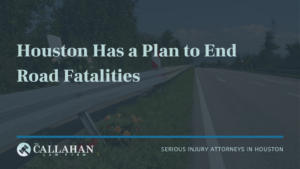Houston Has a Plan to End Road Fatalities

Texas roads have not seen a deathless day since 2000, and Houston has also long been plagued with car accidents, even dubbed the deadliest driving city in America by the Houston Chronicle. But Houston government officials state that they have a plan to end road fatalities within the next decade.
In December of 2020, Mayor Sylvester Turner announced that the city of Houston has finished its Vision Zero Action Plan. Vision Zero is a plan to end roadway deaths and serious injuries by 2030 by improving the safety of Houston roadways, for all modes of transportation. The plan was built in conjunction with other recent plans, including Plan Houston (a plan guiding future developments), Resilient Houston (a framework for protection against future natural disasters), and Houston’s Climate Action Plan (the city’s plan to reduce greenhouse gas emissions).
Turner issued an executive order in August of 2019, committing to end road fatalities and serious injuries on Houston roadways by 2030. Planned over the course of 14 months, the Vision Zero Action Plan takes into account input from local community members, as well as the Vision Zero Executive Committee, Task Force, and Data and Communications Subcommittees.
The Houston community voiced their concerns to the Vision Zero team via surveys and online engagement sessions. The biggest concern residents had was speeding, with other major concerns including a lack of safe crossings and sidewalks, visibility issues, confusing street designs, and excessive distance between crosswalks. They also noted that many intersections feel unsafe for pedestrians, bikers, and wheelchair users, and that many of the city’s bus stops offer no safe places for commuters to wait.
What to Expect
Vision Zero consists of 50 actionable items that the city of Houston will take in order to lower road fatalities and make Houston’s streets more safe, accessible, and pedestrian-friendly. Of these 50 items, there are 13 identified as “priority actions.” These 13 priority actions include constructing 50+ miles of sidewalks and 25+ miles of bike lanes each year, evaluating future projects to ensure that sidewalks and bike trails are added and other accessibility measures are taken, identifying 10 accident hotspots every two years and making necessary changes the following year, and prioritizing street improvements within a half-mile of transit centers in order to improve safety and increase accessibility to those with disabilities.
Other priorities include working to reduce traffic deaths caused by construction zone crashes, developing and distributing educational materials to students and citizens, and revising crosswalk and sidewalk policies. They also plan to implement a system that allows citizens to contribute their own data regarding road safety, risks, and incident reporting, and they are calling upon the city of Houston to train employees on how to talk about accidents and fatalities in a way that avoids victim-blaming or downplaying serious safety issues. They are also set to publicly report Vision Zero action efforts and effectiveness to the citizens of Houston.
Progress Reports
In addition to the implementation of these action items, the city plans to track progress and benchmark the success of their efforts, reporting on serious injuries and road fatalities. The city plans to create a dashboard accessible to the general public that reports accident statistics and measures Vision Zero’s progress. Some of the data that will be measured includes the change in roadway injuries and deaths by mode, demographics, neighborhood, and accounting for changes in population; the percentage of accident hotspots with safety improvements made; the number and percentage of street reconstruction projects with multimodal safety needs; and the mileage of sidewalks and bike lanes constructed and maintained.
They encourage residents to keep voicing their concerns, via their online tools. In addition to keeping the surveys open, they have also implemented a map tool on Let’s Talk Houston’s website. Users can drop pins in the greater Houston area and make note of what concerns them about traffic safety in that area. With the help of the community, Houston can put a stop to road fatalities, lower traffic injuries, and make the roads a safer place for motorists and pedestrians alike.
—
If you or a loved one have been injured as a result of a car accident, contact our Car Accident Lawyers today to see how we can help. Call 713-224-9000, or fill out our contact form to set up a free consultation.

Michael S Callahan is an attorney and founder of The Callahan Law Firm. He focuses his practice on representing individuals and families in personal injury cases involving motor vehicle and truck accidents, workplace accidents and defective products. With over 25 years of experience, he is dedicated to fighting on behalf of people whose lives have been forever altered by the negligence and carelessness of corporations and individuals. Originally trained as a mechanical engineer, Michael has been practicing law and fighting for justice for those who need it most since 1994. He is board-certified in Personal Injury Trial Law by the Texas Board of Legal Specialization and a member of various esteemed legal associations. Outside of work, Michael enjoys spending quality time with his family, outdoor activities, and continually striving to improve as a trial lawyer and human being.











